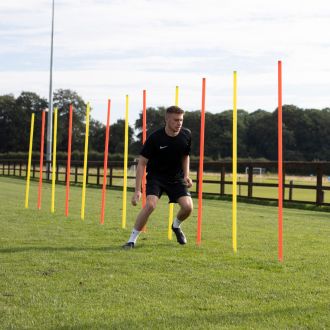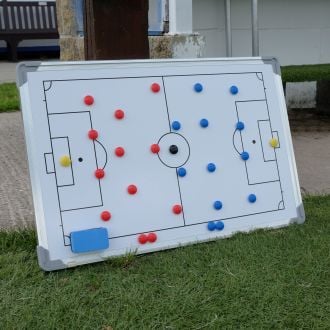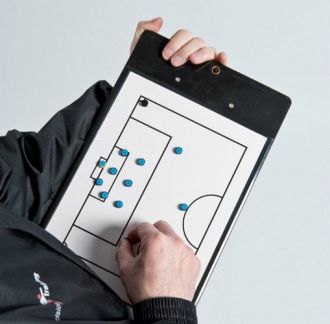How to Become a Professional Football Coach
The road to becoming a professional coach is a long and arduous one, but it is a pathway that is open to everyone with the determination to succeed. Whether candidates have played the game professionally or simply admired it from afar, anyone willing to put in the hard work required can realise their dreams of managing a top side.
The Football Association offers coaching courses for people of all experience levels, and there is a clear pathway to the top that everyone – regardless of their experience in the game – must follow in order to be considered for the top jobs. Whether candidates want a career at the upper echelons of the game or something at grassroots level, the route to success is transparent and open to all.
Level One
This is Britain’s most popular football coaching course, and it is open to anyone over the age of 16. In most cases, little more than a general knowledge of the game is required in order to be accepted onto a course. However, more important is an affinity and passion for football. Level one courses are offered by local FAs throughout the UK, and they consist of both practical and theoretical elements.
The theoretical element of the Level One qualification includes emergency first aid and ensuring the health and safety of children whilst playing football. However, the practical element constitutes a far greater proportion of the time required to qualify. Practical modules include defensive tactics, heading, mini football, pass and control and shooting.
Once a candidate has completed all the training sessions, they must pass a 20-minute assessment. A training session must be delivered, during which the candidate must demonstrate their ability to hold a safe training session, organise a session effectively, create a sense of enjoyment amongst pupils and communicate effectively. The practical stage of the assessment is followed by an interview with an FA assessor.
Level Two
Level Two courses are open to anyone with previous experience in coaching, and there is no mandatory requirement for candidates to be in possession of a Level One qualification.
The theoretical element of a Level Two course goes into great detail on coaching skills and communication. Issues such as football fitness, nutrition, common injuries, the laws of the game, football ethics and planning coaching sessions will be covered in detail. Practical training modules include the teaching of basic techniques, the principles of attacking and defending and the process of warming up before sessions.
Assessment at Level Two is far more stringent and structured than at Level One. Candidates are observed during at least three of their training sessions, and a group of assessors have the job of reviewing the candidate’s coaching skills. All trainees must keep a log book, which should include their action plan, any developmental needs they may have and details of their training plans. A final assessment will include a face-to-face interview, a practical assessment, a review of the candidate’s logbook and an examination on the laws of the game.
Level Three
For candidates aspiring to the upper echelons of the professional game, it may be necessary to acquire the Level Three coaching qualification. The theoretical element of this qualification includes a detailed look at the process of learning, the organisation of teams, drug awareness, preparing and evaluating coaching sessions and player psychology.
There is also an in-depth practical element to the Level Three qualification, which includes the development of possession play, movement to create space, the art of counter-attacking football, regaining possession from the opposition and goalkeeping.
Candidates can choose to undertake an assessment at local or national level. This assessment will include a series of practical coaching sessions, an in-depth interview and a structured examination.
UEFA Licenses
For coaches who want to ply their trade at the very top of the game, a UEFA licence is a necessity. Various clubs and associations offer these courses, and in most cases, the possession of a Level Two football coaching qualification is the minimum entry requirement for the ‘B’ licence. Candidates will need to provide evidence of practical experience in the coaching of 11-a-side teams to gain entry onto a course, as well as a passion for the game.
To coach at Premier League and Championship clubs, a UEFA ‘A’ licence is usually required. Candidates usually need to have a complete UEFA ‘B’ licence to gain entry onto a course, which needs to have been acquired within the last five years. The ‘A’ licence course goes into great detail on the running of effective coaching programmes, and Part 1 will usually require candidates to attend a 13-day residential course. All candidates must spend at least 120 hours of coaching time on the pitch. Part 2 of the course also entails 120 hours of practical coaching time, as well as 8 days spent at a residential facility.
Although the ‘A’ licence is the pinnacle of footballing education for aspiring coaches, anyone who wants to manage a top team in one of the world’s biggest professional leagues will need a UEFA Pro licence. This involves 27 days of intensive learning, which includes classroom time and club site visits. Candidates must have extensive experience in the professional game as a player, coach or manager in order to qualify, as well as a complete UEFA ‘A’ licence.
While the pathway to a career in top-level football coaching is long and complex, it is a path that anyone with determination and a passion for the game can tread. Coaching is a highly rewarding and enjoyable career, and by acquiring the necessary FA and UEFA qualifications, anyone with a love of football and a desire to coach it can forge a career of their own.





